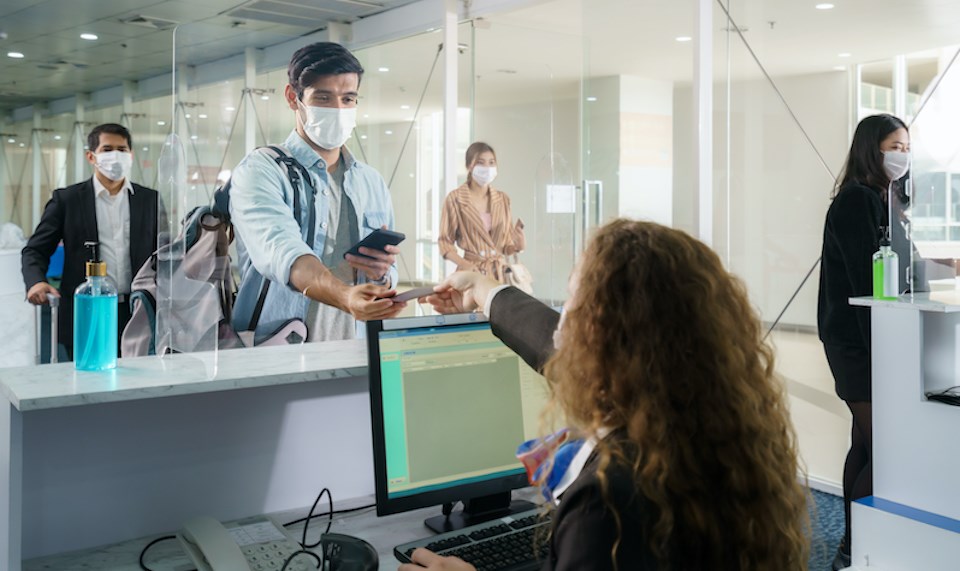Canada has introduced relaxed coronavirus travel requirements for children and fully vaccinated travellers but some measures remain in effect.
On Friday (April 22), the Government of Canada announced it is dropping some of its requirements for fully vaccinated travellers. They will no longer have to follow certain safety protocols for 14 days after entry to the country, including things like wearing face masks and monitoring themselves for symptoms of COVID-19.
Additionally, all fully vaccinated travellers will no longer be required to provide a quarantine plan upon entry.
Canada will also drop the pre-entry testing requirement for unvaccinated and partially vaccinated children ages five to 11 who are accompanied by fully vaccinated adults.
The new measures will come into effect on Monday (April 25).
Canada's entry requirements continue to evolve this year as countries around the world open up their borders to visitors, with many of them also dropping their COVID-19 testing requirements for entry.
Although Canada is easing some restrictions, Transport Minister Omar Alghabra noted that air and rail travellers must continue to wear a mask throughout their travel journey.
"Wearing a mask offers an extra layer of protection for you and your fellow travellers, and will help keep Canadians, workers and our transportation system safe," he said.
Changes to coronavirus requirements for fully vaccinated travellers to Canada
Fully vaccinated travellers to Canada will no longer need to provide a quarantine plan upon entry.
They will no longer be federally required to do the following for 14 days after arriving:
- mask while in public spaces;
- monitor and report if they develop signs or symptoms;
- quarantine if another traveller in the same travel group exhibits signs or symptoms or tests positive; and
- maintain a list of close contacts and locations visited.
Canada's changes to travel rules for children
Unvaccinated or partially vaccinated children aged 5-11 who are accompanied by a fully vaccinated parent, step-parent, guardian or tutor will no longer be required to complete a pre-entry COVID-19 test for entry to Canada.
Pre-entry tests will still be required for partially vaccinated or unvaccinated travellers 12 and older.
Children under 5 years of age are not required to provide a COVID-19 test result.
What if I'm only partially vaccinated or unvaccinated?
The rules are not changing for partially vaccinated or unvaccinated travellers. Unless otherwise exempt, all travellers 5 years of age or older who do not qualify as fully vaccinated must continue to provide proof of an accepted type of pre-entry COVID-19 test result:
- a valid, negative antigen test, administered or observed by an accredited lab or testing provider, taken outside of Canada no more than one day before their initially scheduled flight departure time or their arrival at the land border or marine port of entry; or
- a valid negative molecular test taken no more than 72 hours before their initially scheduled flight departure time or their arrival at the land border or marine port of entry; or
- a previous positive molecular test taken at least 10 calendar days and no more than 180 calendar days before their initially scheduled flight departure time or their arrival at the land border or marine port of entry. It is important to note that positive antigen test results will not be accepted.
Who is subject to random COVID-19 testing?
Any fully vaccinated traveller may be randomly selected for a COVID-19 molecular test. Travellers selected for mandatory random testing are not required to quarantine while awaiting their test results.
What happens if you test positive?
While you don't have to wait for your test results if you are randomly selected for COVID-19 testing, you will have to quarantine if you test positive for the virus.
If you test positive, or develop symptoms, during the 14 days after you arrive in Canada, you are required to isolate for 10 days from the start of symptoms or the specimen collection date validated by the test provider or the date the test result is received (if specimen collection date not available), even if your province or territory has a shorter isolation period.
You might have to quarantine in Canada when you return from a trip even if you don't have COVID-19
Individuals who recover from an infection can "continue to have detectable SARS-CoV-2 RNA in upper respiratory specimens for up to [three] months after illness onset," according to the Centers for Disease Control and Prevention (CDC).
In other words, people who may have contracted COVID-19 within 90 to 180 days could still test positive for the virus, which means they may have to quarantine on arrival to Canada if they are randomly selected — even if they are not currently ill.
Find out more details about the testing issue and important insurance considerations.
Do I still need to take a COVID-19 test to go on a cruise?
Alghabra said that the federal announcement will not apply to cruising but cruise passengers are no longer be required to take a test prior to disembarkation from the cruise.
All crew and passengers must be fully vaccinated against COVID-19 to board a cruise ship. And while children under 12 may be permitted onboard without showing proof of vaccination, some cruise lines may require children 5 and up to be vaccinated.
Passengers must also take a COVID-19 molecular test within 72-hours before boarding a cruise ship or take an antigen test within one day of the scheduled departure.
Many Canadian jurisdictions have dropped mask mandates, but travellers arriving at ports of entry are still required to wear a mask at the port. Given the high volume of travellers, wearing a proper-fitting mask is a requirement at these locations.
ArriveCAN App remains in place
All travellers, regardless of how long they were away from Canada, continue to be required to submit their mandatory information via ArriveCAN (free mobile app or website), including contact and travel information, as well as proof of vaccination.
Find out how to use the app with Vancouver Is Awesome's guide.




